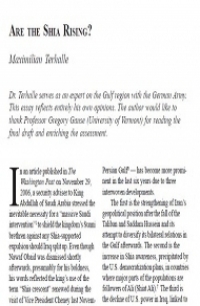
?ARE THE SHIA RISING
The second is the increase in Shia awareness, precipitated by the U.S. democratization plans, in countries where major parts of the populations are followers of Ali (Shiat Ali).7 The third is the decline of U.S. power in Iraq, linked to Iran's successful defiance of international pressure to halt its nuclear program, as well as its subsequent rhetorical hubris, which increasingly frightens its neighbors. Saudi Arabia has successfully engaged its Shia population despite continuing religious affronts by conservative clerics, who branded them rafida (rejectionists).18 Having used state force to crack down on Shia riots in 1979 and 1980, and after massive internal disputes emanating from a socioeconomic crisis, the Saudi royal elite recognized in the 1990s that accommodating the Shia opposition could easily temper a serious conflict.\n Third, nationalism has had a firmer grip on Shia loyalty than common beliefs, thereby undercutting politically exploited aspirations.
- عناوین
- موضوع ها
